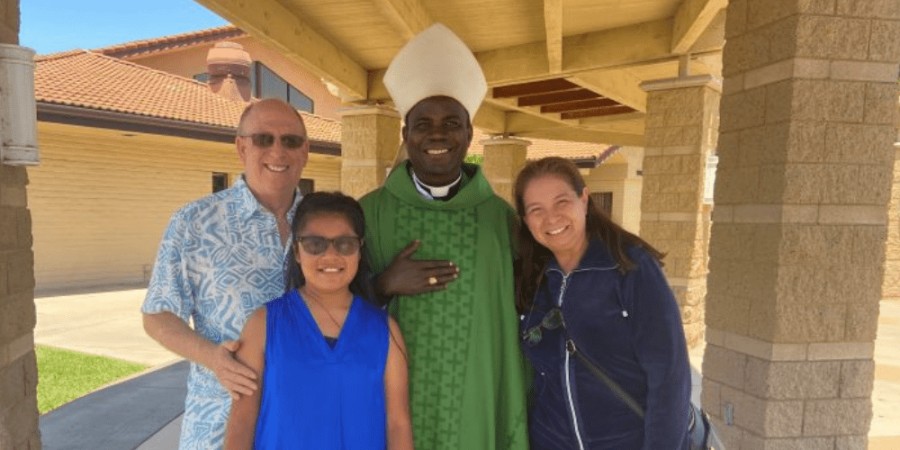
Moses Chikwe ‘04, auxiliary bishop of Owerri, Nigeria, came to the U.S. nearly two decades ago to pursue a graduate degree and then worked in California for several years before returning to his native country in 2016. Last December, he made news headlines when he and his driver were kidnapped and held captive for five days—an experience that’s become common amidst Nigeria’s struggles with corruption and political strife. We spoke to Auxiliary Bishop Chikwe recently, when he was visiting the U.S., about his experience at LMU and what helped him overcome the harrowing experience of being snatched off the street.
What prompted you to come to the U.S. to earn a master’s degree?
My Archbishop in Nigeria wanted me to study educational leadership and administration. He pointed me toward LMU School of Education, not only because it’s a Jesuit institution, but also because of the high quality of the training it offers. I was able to attend LMU thanks to a generous scholarship I received. During my time there, professor Mary McCullough was pivotal to my accomplishments and was always supportive of my goals as a future educator and leader.
I went on to earn a doctorate at UCLA and then got a job with a Veterans Administration Hospital in La Jolla. In that role I managed programs that supported former members of the military in various capacities. Though my job encompassed subjects beyond education, the leadership and administrative skills I learned at LMU were critical in helping me succeed there, and later here in Nigeria. My LMU education gave me a solid foundation that has played a big role in the story of my life.
Tell us more about your current role in Owerri’s Catholic schools.
When I returned to Nigeria in 2016, my archbishop appointed me to the role of associate director of the education commission. After two years in that role, I took over for the director that I’d been working under, and I was named auxiliary bishop in 2019. I’m now in a supervisory role over all the schools in this archdiocese.
Catholic schools have always played a complementary or secondary role to public education in Nigeria. But they are playing an increasingly important role in the future of the country because the schools run by the government have been neglected and mismanaged. The buildings are crumbling and rundown. After our civil war of 1967-70 ended, the government took over all schools and they became places for sowing seeds of division and political dissent. When the archdiocese regained authority to run our schools, they were just a shadow of their former selves. We had to rebuild both the infrastructure itself and the academic and moral structures of the Catholic education system here. Even though we still have a lot to do, I feel very confident that we are on a better path. Most importantly, we are ensuring that children, our students, can really study and learn to appreciate the value of academic accomplishments.
What went through your mind when you were kidnapped last winter? How did this ordeal change you?
Kidnappings are not infrequent in Nigeria, unfortunately. Our captors stopped the car that my driver and I were in and ordered us to get into their van. They drove us to the jungle and made us walk with them, barefoot and blindfolded, for five days.
As is often the case when people undergo a traumatic incident, I was in denial at first. I kept thinking, is this really happening to me? But it quickly became clear that yes, I was in the hands of criminals. They threatened us, slapped us, told us they’d keep us for as long as it takes for ransom money to arrive from the Church.
I was scared of course, and worried about my driver, who has young children. And upset at how we were being treated. But a couple of days in, a vision came to me of the passion of the Christ. He was tortured, crucified, forced to wear a crown of thorns. When I had that vision, I realized that my suffering was not even a fraction of his and decided I would not allow the captors’ actions to unnerve me. This vision helped me become numb to their threats and insults; it was a moment of grace and faith.
Eventually the captors realized that a ransom from the church was not forthcoming. After five days in the jungle, the leader apologized and asked for my forgiveness. He admitted that they’d been resorting to crime out of frustration and anger. I told him that I forgave all of them already, that I hoped they’d forgive me for any wrongs I’d done to them, and that I’d pray for them to find a way toward meaningful lives.
I still feel hypervigilant sometimes, especially when I am out and about at night. But I am mostly healed from the experience. I wouldn’t have necessarily chosen to go through such a thing, but now I feel a strong connection to the suffering of all people of Nigeria. It has given me a different understanding, and deeper empathy. And it has been very healing to see friends here in California that I’ve known for years and vice versa. For them, it was like seeing somebody resurrected from the dead.



